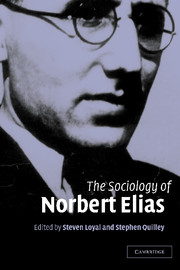Book contents
- Frontmatter
- Contents
- List of contributors
- Acknowledgements
- 1 Towards a ‘central theory’: the scope and relevance of the sociology of Norbert Elias
- Part I Sociology as a human science: Norbert Elias and the sociology of knowledge
- Part II Processes of stratification: figurations of race, class and gender
- Part III The formation of individuals and states
- Part IV Religion and civilizing processes: Weber and Elias compared
- 14 Weber and Elias on religion and violence: warrior charisma and the civilizing process
- 15 Christian religion and the European civilizing process: the views of Norbert Elias and Max Weber compared in the context of the Augustinian and Lucretian traditions
- Index
- References
14 - Weber and Elias on religion and violence: warrior charisma and the civilizing process
Published online by Cambridge University Press: 22 September 2009
- Frontmatter
- Contents
- List of contributors
- Acknowledgements
- 1 Towards a ‘central theory’: the scope and relevance of the sociology of Norbert Elias
- Part I Sociology as a human science: Norbert Elias and the sociology of knowledge
- Part II Processes of stratification: figurations of race, class and gender
- Part III The formation of individuals and states
- Part IV Religion and civilizing processes: Weber and Elias compared
- 14 Weber and Elias on religion and violence: warrior charisma and the civilizing process
- 15 Christian religion and the European civilizing process: the views of Norbert Elias and Max Weber compared in the context of the Augustinian and Lucretian traditions
- Index
- References
Summary
Introduction: charisma, routinization and the civilizing process
In a famous passage from the Ynglingsaga, we hear about the comrades of Odin who ‘went without shields, and were mad as dogs or wolves, and bit on their shields, and were as strong as bears or bulls; men they slew, and neither fire nor steel would deal with them; and this is what is called the fury of the berserker’ (Morris and Magnusson 1893:1, 16–17). This passage could usefully function as a preface to either The Civilizing Process or Economy and Society. We can interpret Norbert Elias's theory of the civilizing process as, amongst other things, a history of the decline of the warrior stratum in European feudalism and the rise of the court society. The emergence of a pacified court society and the technological development of weapons employing gunpowder eventually transformed the social functions and status of feudal warlords and their followers. These changes in civility also chart the formation of the nation-state and the centralization of institutional power. The transformation of the emotions is an important feature of this history. In the discussion ‘On changes in aggressiveness’, Elias (2000: 161–2) provides an important account of how violent passions in the early feudal period were slowly regulated as the civilized forms of court society evolved. In this chapter I develop an argument that there are important parallels between Max Weber's account of the routinization of charisma in military bureaucracies and Elias's analysis of the decline of militarized feudalism.
- Type
- Chapter
- Information
- The Sociology of Norbert Elias , pp. 245 - 264Publisher: Cambridge University PressPrint publication year: 2004
References
- 11
- Cited by



